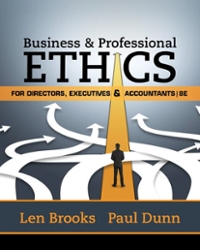Wal-Mart has a brand image that triggers strong reactions in North America, particularly from people whose businesses
Question:
Wal-Mart has a brand image that triggers strong reactions in North America, particularly from people whose businesses have been damaged by the company’s overpowering competition with low prices and vast selection and by those who value the smallbusiness/
small-town culture that has been supplanted. The company does not need any more controversy and has taken on causes such as environmental sustainability and rushing aid to hurricane victims, partly to build brand support. Consequently, according to the New York Times,1 from September 2005 when a report of significant bribery in Wal-Mart de Mexico was received, senior officers in Mexico and then the United States sought to keep the matter quiet, impede company investigations, blunt the efforts of qualified investigators, refer the matter to senior company lawyers implicated in the scandal for investigation and resolution, weaken company protocols for investigation and reporting, and promote executives involved. As is often the case today, the bribery scandal could not be hushed up, and now the company faces prosecution under the U.S. Foreign Corrupt Practices Act (FCPA) as well as significantly more damage to Wal-Mart’s image and credibility.
Wal-Mart issued an immediate response2 to the New York Times article indicating nontolerance for bribery and committing to get to the bottom of the allegations. The company also stated that it had met, at its request, with the U.S.
Department of Justice and the SEC about the matters raised and had disclosed the investigation in the company’s 10-Q filing in December 2011. Unfortunately, dealing partially with the matter six years after it was first raised did little to appease the company’s critics.
In September 2005, a senior Wal-Mart lawyer received an e-mail from a former Mexican executive, Mr. Cicero, a lawyer, who had been in charge of the bribery payments process, using gestores (trusted fixers)
to speed up permits for store construction, obtain confidential information, and eliminate fines. “Bribes, he
[Cicero] explained, accelerated growth.
They got zoning maps changed. They made environmental objections vanish.
Permits that typically took months to process magically materialized in days.”
According to Cicero, the Mexican operations of Wal-Mart had a culture of “very aggressive growth goals” in which doing
“whatever was necessary” to obtain building and construction permits facilitated the opening of new stores “in record times.”
Wal-Mart was the largest private employer in Mexico, employing 209,000 people.3 Wal-Mart investigators were sent immediately from the United States and established the veracity of a paper trail for \($24\) million in bribery payments. When they wanted to expand their investigation, the U.S. executives of Wal-Mart shut it down.
According to the New York Times article, senior executives were “under fire from labor critics, worried about press leaks, and facing sagging stock prices … recognized that the allegations could have devastating consequences.” No one was disciplined, an executive involved was promoted to a senior post at Wal-Mart headquarters, and investigators were criticized for being overly aggressive by H. Lee Scott, Wal-Mart’s chief executive. Responsibility for the investigations was shifted, investigators were confined only to “significant”
matters, and administrative oversight and approvals were increased. In time, a law firm was hired, and a full investigation was recommended. This was rejected by senior Wal-Mart executives, and a special in-house, major corruption investigations unit was created. But the unit was under resourced, and senior executives were allowed to transfer some sensitive cases involving themselves or their people to other units and individuals. The Mexican bribery investigation was reassigned.
Ms. Munich, the general counsel of Wal-
Mart International, who had received the original e-mail and had triggered the initial investigation, complained about these changes and ultimately resigned in 2006.........
Questions:-
1. Where were Wal-Mart’s questionable payments made, and where did this result in serious damage to the company and its executives? Why?
2. The gestores payments were made to third parties who then bribed local officials. How would a company ensure that its third-party vendors are operating within the law?
3. Some of Wal-Mart’s senior executives knew about the bribes but did not take any effective actions to curtail this activity. What steps should the board of directors take to ensure that systems and internal controls are in place so that they are informed about questionable managerial activities and actions?
4. Wal-Mart Mexico seemed to have a culture of the goal justifying the means. How can the board of directors ensure that the operational activities of the company do not subvert proper governance objectives?
Step by Step Answer:

Business And Professional Ethics
ISBN: 9781337514460
8th Edition
Authors: Leonard J Brooks, Paul Dunn





